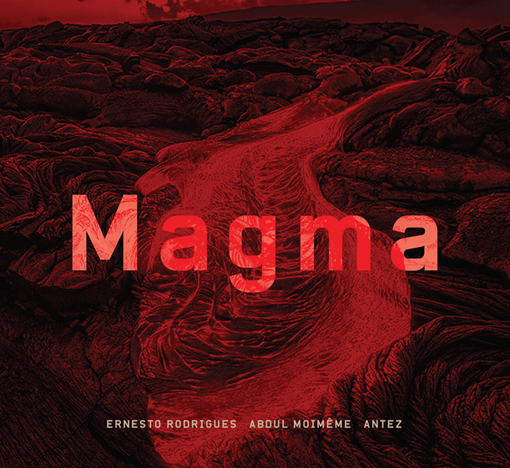An eruption of sound from the long-standing collaboration of violist
Ernesto Rodrigues and Abdul Moimeme, here on prepared electric guitar,
in a trio with unique percussionist Antez, whose intimate relationship
with
the percussive objects he uses creates a tectonic aural range of
explosive flows and deeply churning cymbal vibration.
Squidco
"[...] Magma, on which Moimême & Rodrigues are joined (again) by
metallic percussionist Antez in quite an eruption, less about
twittering details of counterpoint or perception than an assertive,
quasi-singular (& often violent) line of articulation. (In contrast
to the post-serial investigations of Sitsa, then, Magma can be heard
more as a distillation of heavy metal, perhaps in literal terms....)
Todd Mc
Comb's, Jazz Thoughts
Primeiro é o silêncio. Depois, quando esperávamos que dele crescessem
pequenos sons,
segundo a cartilha da tendência reducionista da improvisação (Ernesto
Rodrigues, o violetista,
tem sido um dos seus rostos a nível internacional), é o que parece um
trovão o que ouvimos.
Súbito e violento, com outros rebentamentos a acontecerem logo de
seguida. Pelo meio,
julgamos escutar uma copiosa chuva. É de modo descritivo, imagético,
mas ilusório,
que começa este “Magma”, com Abdul Moimême a fazer um impactante uso
das enormes
chapas que habitualmente coloca sobre as suas guitarras horizontais e o
francês
Antez a acrescentar elementos de sua lavra com um “set” de percussão.
Quando começamos a ouvir a viola de Rodrigues as construções sonoras
tornam-se mais abstractas:
o que ouvimos não é, afinal, uma tempestade, mas a mimetização de um
mundo subterrâneo,
feito de lava e rocha, tão vivo quanto o que se passa à superfície, com
fogo líquido a
derramar-se sobre precipícios e blocos de granito a colidirem.
Não há formas propriamente neste onirismo de carácter cinematográfico,
mas sombras,
lampejos de cor, movimentos, cada percepção destes provocando-nos uma
inquietude que
já não podemos racionalizar. O formato é electroacústico, mas o que
aqui vem não
corresponde aos modos e fazeres da EAI ou de qualquer outro tipo de
abordagem da
música experimental que recorre a dispositivos eléctricos e
electrónicos.
É outro o plano de realizações, algures entre o cabalismo metálico de
um Z’ev,
o rico imaginário tímbrico e textural de Xenakis e o black metal
exploratório dos Sunn =))),
numa progressão que, tal como os sonhos, ganha intriga e enredo, mas
não uma narrativa lógica.
Rodrigues e os seus pares neste trio já estão em pleno
pós-reducionismo.
E, quem diria, um pós-reducionismo sensitivo, visual, todo ele feito de
emoções…
Rui Eduardo Paes for Jazz.pt
The question that lingers over Magma, by the trio of violist Ernesto
Rodrigues, guitarist Abdul Moimême and percussionist Antez, is whether
the artists were conscious of the visual aspects created by their
music. Of our five senses—taste, sight, touch, smell and sound—it is,
of course, the perception of sound that we attribute to music. This is
not about the observation of musicians going about their performance as
much as the visuals created by the sound itself. Only the audience at
Lisboa Incomum in February 2018 witnessed this performance. Captured
here is this digital signal and the extraordinary images it creates in
the mind's eye, or rather ear.
The recording is comprised of a single 44 minute free-improvisation
track. Rodrigues and Moimême, mainstays of the Portuguese creative
music scene, can be heard together on dozens of recordings. Whether the
setting is a large ensemble like the Variable Geometry Orchestra, IKB
and String Theory or in duos or solo, the pair stand out as
trailblazers and explorers of sounds. They are joined here by Antez
here, in a follow up to the trio's Basalto (Creative Sources, 2016).
The thunderous opening gives way to an atmospheric resonance of
frizzled electric and massaged strings.
Without having been at at this performance sometimes it is difficult to
sort out which musician is making what sound. And maybe that is why
this recording works. Forget the appellation of guitar, viola or
cymbal, these sounds are conjured from primordial origins. Think the
Big Bang or a time lapsed opening of a fern. Or don't, because the
images this music makes in one listener's head can almost never be the
same as those imagined in another's.
MarK Corroto for All about Jazz.